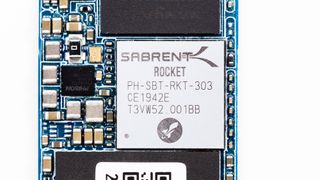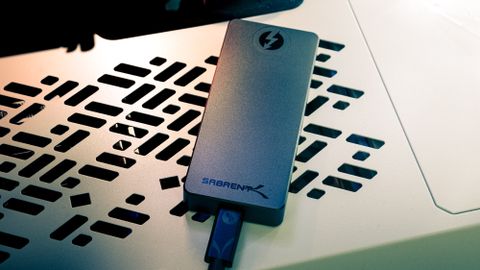Why you can trust Tom's Hardware
Sabrent’s Rocket XTRM-Q is about offering value as much as it is about satisfying other storage needs. For years, we have been hearing the cries of content creators asking for faster and higher-capacity portable SSDs. Yet Samsung, WD, and Seagate have all ignored their cries in one way or another. While the Thunderbolt 3 interface has helped many satisfy their speed fix, those who needed 4TB-8TB of capacity for their workflows have had to stick to much slower hard drives. That changes with Sabrent’s Rocket XTRM-Q.

While most competitors still top out at capacities of 2TB, Sabrent’s Rocket XTRM-Q is the only portable SSD available in a covernous 8TB size. It not only delivers capacity, its read performance and write performance are fantastic as well. That is, they’re great as long as there is enough cache space available for your workload. While the drive commanded respect in its file-transfer performance in our rather burst oriented testing, large write transfers can suffer if they exceed the SLC write cache. And that cache gets smaller the fuller the drive.
When backing up 4TB of data from my main computer to the Rocket XTRM-Q over a USB 3.2 Gen 2 controller, the performance was great, hovering at roughly 900 MBps for the first 2TB transferred. But, once the 2TB cache on our 8TB sample filled, speeds degraded to 150 MBps on average, even over the slower interface. After pausing the transfer and letting the device idle a bit, performance recovered. But just be aware, if you need to write massive amounts of data at once, the device’s speed will depend on how much free space it has.
The device is a compelling buy for those needing lots and lots of storage space and is very competitively priced. While Samsung’s X5 outperforms the Rocket XTRM-Q in its read performance, it is priced significantly higher per GB and can only interface with TB3 hosts.
However, LaCie’s Rugged SSD Pro gives the Rocket XTRM-Q a good run for its money. Both feature USB and TB3 compatibility, but overall device design differs quite a bit. LaCie features a Phison E12-based FireCuda 510 NVMe SSD with TLC NAND flash, which wipes the floor with the XTRM-Q once the cache runs out. Alternatively, G-Technology’s G-Drive mobile Pro SSD offers some incredible write performance, but lacks the USB compatibility of the Sabrent and LaCie Rugged SSD Pro, and its interface controller can be dodgy with older TB3 host chips.
Sabrent’s Rocket XTRM-Q is an excellent pick if you plan on using it with a multitude of devices and across platforms. If you are in the market for something as high in density as Sabrent’s Rocket XTRM-Q, we must say that without much competition at the moment this is the drive for you. While it is expensive and the QLC NAND flash can be slow at times, competitive pricing, fast performance, and attractive, durable design prop Sabrent’s Rocket XTRM-Q up as one of the best portable SSDs available.
MORE: Best SSDs
MORE: How We Test HDDs And SSDs
MORE: All SSD Content

Sean is a Contributing Editor at Tom’s Hardware US, covering storage hardware.
-
bkuhl "While most competitors still top out at capacities of 2TB, Sabrent’s Rocket XTRM-Q is the only portable SSD available in a covernous 8TB size. "Reply
Covernous? Did you mean cavernous? -
omnitrixpower95 USB 3.2 Gen 3/4/5/6? oh no they have made it even worse than it already was wtfReply -
Rockenrog Despite all the work, it is an Apples and Oranges comparison. If a 1TB version of the Sabrent XTRM-Q were tested the result would have been grossly different. With an empty 1TB XTRM-Q the speed will drop at about 125GB. OK, that is enough for me. But if my drive is 75% full, then the speed will drop off very quickly to slower than USB3.2 speeds!Reply
Come on Sean, no more Apples and Oranges!

